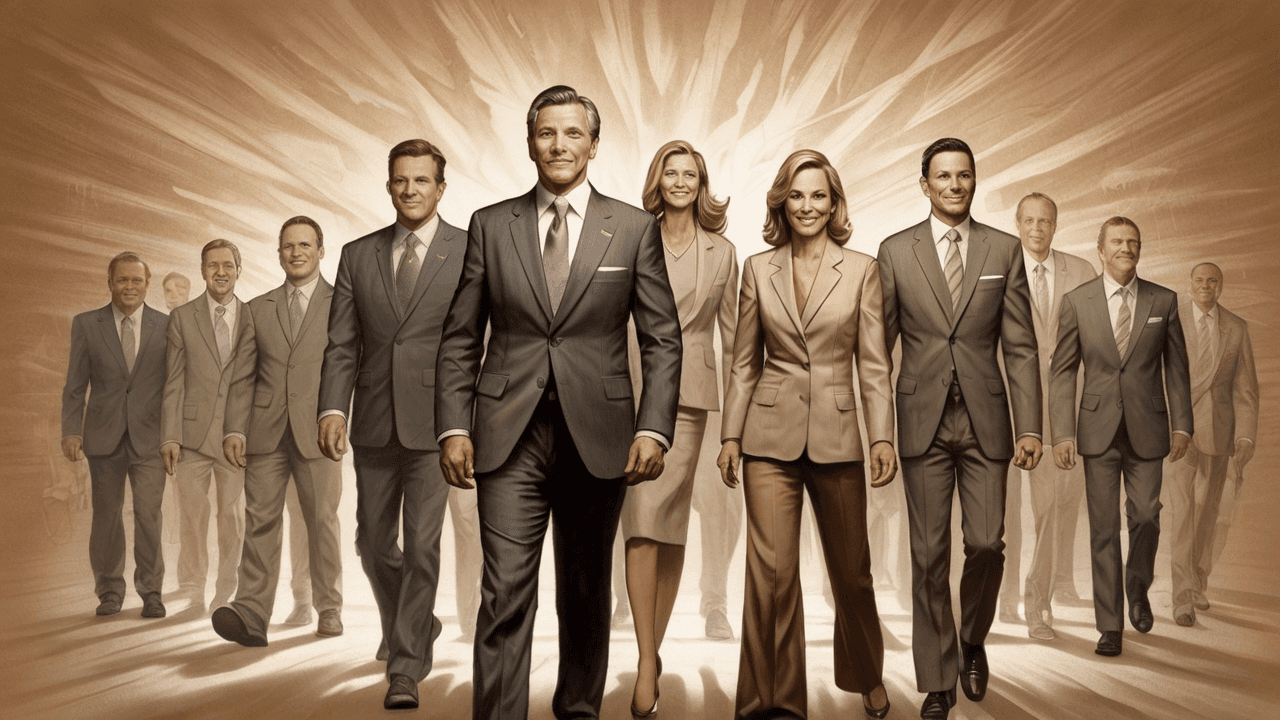Forging Unbreakable Teams: 8 Essential Traits of Exceptional Leaders
Jun 25, 2024
In the ever-evolving landscape of the modern business world, the need for exceptional leadership has never been more crucial. While it's easy to lead when the seas are calm, the true mark of a great leader is their ability to guide their team through the most turbulent of storms.
Throughout history, we've witnessed the rise of visionary individuals who have not only weathered the fiercest of challenges but have also emerged stronger, inspiring their teams to reach new heights of success. By studying the lives and legacies of these legendary leaders, we can uncover the essential traits that empower them to pull their organizations through the toughest of times.
Grit: The Unbreakable Spirit of Exceptional Leaders
Grit, as defined by psychologist Angela Duckworth, is a combination of passion, perseverance, and the ability to overcome setbacks. It is this unwavering determination that sets apart the truly great leaders from the rest.
Consider the example of Sir Ernest Shackleton, the renowned explorer who led his team on a perilous expedition to the Antarctic in the early 20th century. When their ship, the Endurance, became trapped and eventually crushed by the ice, Shackleton and his crew faced a seemingly insurmountable challenge. With their vessel destroyed and their supplies dwindling, they were stranded on the frozen tundra, thousands of miles from civilization.
Yet, Shackleton's grit and resolute leadership never wavered. He rallied his team, instilling in them a sense of purpose and a belief that they would all make it home safely. Through sheer determination and a refusal to give up, Shackleton and his crew embarked on a harrowing journey, navigating treacherous seas in small boats and ultimately reaching the remote island of South Georgia, where they could finally seek rescue.
The story of Shackleton's expedition is a testament to the power of grit in the face of adversity. By maintaining their courage, resolve, and strength of character, Shackleton and his team were able to overcome seemingly insurmountable obstacles and emerge victorious.
This quality of grit is not limited to the realm of exploration; it is a hallmark of exceptional leaders in every field, from business to politics to the military. When the going gets tough, gritty leaders refuse to be deterred, drawing upon an inner well of resilience to push forward and inspire their teams to do the same.
Optimism: The Fuel That Propels Teams Forward
While grit is essential for navigating the present, optimism is the component of leadership that looks towards the future. Great leaders possess the ability to maintain a positive, forward-looking mindset, even in the face of daunting challenges.
Consider the example of Winston Churchill, the iconic British Prime Minister who led his country through the darkest days of World War II. As the Nazi forces advanced across Europe, threatening to overwhelm the United Kingdom, Churchill could have easily succumbed to despair and defeatism. Instead, he rallied the British people with his unwavering optimism and determination.
In his famous "We Shall Fight on the Beaches" speech, Churchill famously declared, "We shall not flag or fail. We shall go on to the end, we shall fight in France, we shall fight on the seas and oceans, we shall fight with growing confidence and growing strength in the air, we shall defend our island, whatever the cost may be."
This powerful message of hope and resilience resonated with the British people, inspiring them to stand firm in the face of the Nazi onslaught. Churchill's optimism, combined with his grit and resolute leadership, helped to rally the nation and ultimately secure victory.
Optimism is not merely a feel-good sentiment; it is a strategic tool that great leaders wield to foster a sense of belief and purpose within their teams. By maintaining a positive outlook and a conviction that better days lie ahead, leaders can create a mental framework that empowers their teams to push through even the darkest of times.
Pragmatism: Balancing Vision and Practicality
While grit and optimism are essential qualities of exceptional leadership, they must be tempered with a healthy dose of pragmatism. The greatest leaders are able to blend visionary thinking with practical intelligence, navigating complex challenges with clarity and sound judgment.
One such leader is Dwight D. Eisenhower, the renowned general who led the Allied forces to victory in World War II and later served as the 34th President of the United States. Eisenhower's success was rooted in his ability to balance his strategic vision with a keen understanding of the realities on the ground.
As the Supreme Allied Commander during the war, Eisenhower was tasked with coordinating the massive logistical and military operations that would ultimately lead to the liberation of Europe. He recognized that victory would require not only bold, decisive action but also meticulous planning and the ability to adapt to changing circumstances.
Eisenhower's pragmatism was evident in his approach to the D-Day landings, one of the most pivotal military operations in history. Rather than relying solely on optimism or grit, he carefully weighed the risks and challenges, developing contingency plans and ensuring that his troops were equipped with the necessary resources and support to succeed.
This blend of vision and practicality allowed Eisenhower to make tough decisions, navigate complex political and military landscapes, and ultimately lead his team to victory. His example serves as a testament to the power of pragmatic leadership, where the ability to think strategically and act decisively is tempered by a deep understanding of the realities on the ground.
Selflessness: Putting the Team Before Personal Interests
In the annals of great leadership, one trait that consistently stands out is the ability of leaders to put the needs of their team and their organization before their own personal interests. This selfless dedication to a greater cause is a hallmark of the most revered leaders throughout history.
One such leader is Mahatma Gandhi, the iconic figure who led India's non-violent struggle for independence from the British Empire. Gandhi's unwavering commitment to the principles of non-violence and civil disobedience was rooted in his deep sense of selflessness and his belief in the inherent dignity of all human beings.
Despite facing immense personal hardship and the threat of imprisonment, Gandhi remained steadfast in his dedication to the cause of Indian independence. He refused to compromise his principles, even in the face of overwhelming pressure from the colonial authorities. Instead, he inspired millions of his countrymen to join him in peaceful protests and acts of civil disobedience, ultimately toppling the mighty British Empire through the sheer power of moral authority.
Gandhi's example of selfless leadership is a testament to the transformative power of putting the greater good before personal interests. By consistently placing the needs of his people and his nation above his own, he was able to inspire a movement that would change the course of history.
This spirit of selflessness is not limited to the realm of politics and social movements; it is also a hallmark of exceptional leaders in the business world. Consider the example of Herb Kelleher, the co-founder and former CEO of Southwest Airlines. Kelleher was known for his unwavering commitment to his employees, often prioritizing their well-being and job security over short-term profits.
During times of economic downturn, Kelleher would refuse to lay off employees, instead finding creative ways to cut costs and preserve jobs. This selfless approach to leadership not only earned him the loyalty and respect of his team but also contributed to Southwest's long-term success as a company.
By putting the needs of their teams and organizations before their own personal interests, leaders like Gandhi and Kelleher have demonstrated the transformative power of selfless leadership. In doing so, they have inspired generations of individuals to follow in their footsteps, using their positions of influence to create positive change and empower those around them.
Resolution: Maintaining Firm Command in the Face of Adversity
In times of crisis, when the very foundations of an organization are being tested, the ability of a leader to maintain firm command and decisiveness can be the difference between success and failure. Great leaders understand that in the face of dissent, uncertainty, or even mutiny, they must remain resolute and unwavering in their commitment to the team's shared goals.
One such leader who exemplified this quality of resolution was General George Patton, the legendary American military commander who played a pivotal role in the Allied victory during World War II. Patton was known for his uncompromising leadership style, his unwavering determination, and his ability to inspire his troops to achieve seemingly impossible feats.
During the Battle of the Bulge, one of the fiercest and most pivotal battles of the war, Patton's troops were facing overwhelming odds and the threat of being surrounded by the German forces. In the face of this crisis, Patton demonstrated his resolute leadership, rallying his troops and leading them in a daring counterattack that ultimately turned the tide of the battle.
Patton's ability to maintain firm command and decisiveness in the midst of chaos was a testament to his strength of character and his unwavering commitment to his mission. He refused to be cowed by the challenges that confronted him, instead using his resolute leadership to inspire his troops and secure victory.
This quality of resolution is not limited to the military; it is also essential for leaders in the business world, where they must navigate complex challenges and make tough decisions that can have far-reaching consequences. Great business leaders, like former GE CEO Jack Welch, have demonstrated the ability to make difficult choices, even in the face of dissent or opposition from their teams.
Welch's tenure at GE was marked by his willingness to make bold, decisive moves, including the restructuring of the company and the implementation of controversial policies like the "rank and yank" system. While these decisions were not always popular, Welch's resolute leadership and his unwavering commitment to GE's long-term success ultimately paid off, transforming the company into a global powerhouse.
By maintaining firm command and decisiveness in the face of adversity, leaders like Patton and Welch have shown that true leadership is not about popularity or consensus-building, but about making the tough choices necessary to achieve the greater good. This quality of resolution is a hallmark of exceptional leaders, and it is one that can inspire teams to overcome even the most daunting of challenges.
Encouragement: Uplifting the Team Through Genuine Praise and Empathy
In the midst of a crisis, when the challenges facing a team seem insurmountable, the ability of a leader to provide genuine encouragement and support can be a game-changer. Great leaders understand that their role is not just to issue commands and make tough decisions, but to uplift and empower their teams, fostering a sense of belief and purpose that can carry them through even the darkest of times.
One leader who exemplified this quality of encouragement was Ernest Shackleton, the renowned explorer whose expedition to the Antarctic was marked by a series of harrowing challenges and setbacks. Despite the seemingly hopeless situation facing his crew, Shackleton remained steadfast in his commitment to their well-being, providing them with the emotional support and encouragement they needed to persevere.
Throughout the expedition, Shackleton made a point of regularly checking in with his team, offering words of praise and reassurance, and ensuring that their morale remained high. He recognized that the physical and mental toll of their ordeal was immense, and he worked tirelessly to keep his crew motivated and focused on the ultimate goal of reaching safety.
Shackleton's approach to leadership was not just about issuing orders or making tough decisions; it was about creating an environment of trust, empathy, and genuine care for his team. By providing them with the encouragement and support they needed, he was able to inspire them to push beyond their limits and ultimately achieve the seemingly impossible.
This quality of encouragement is not limited to the realm of exploration; it is also essential for leaders in the business world, where the ability to motivate and inspire their teams can be the difference between success and failure.
Consider the example of Herb Kelleher, the co-founder and former CEO of Southwest Airlines. Kelleher was known for his hands-on approach to leadership, regularly visiting the company's various locations and taking the time to connect with his employees on a personal level. He understood that by providing genuine encouragement and support, he could foster a sense of loyalty and commitment that would ultimately drive the company's success.
By embodying the qualities of encouragement and empathy, leaders like Shackleton and Kelleher have demonstrated the transformative power of uplifting their teams. In doing so, they have not only navigated their organizations through the toughest of times but have also inspired generations of individuals to follow in their footsteps, using their positions of influence to create positive change and empower those around them.
Preparedness: Anticipating Challenges and Equipping the Team for Success
In the face of adversity, the ability of a leader to anticipate potential challenges and equip their team with the necessary resources and knowledge to weather any storm can be the difference between success and failure. Great leaders understand that true preparedness is not just about having a contingency plan, but about fostering a culture of resilience and adaptability within their organizations.
One leader who exemplified this quality of preparedness was Dwight D. Eisenhower, the renowned general who led the Allied forces to victory in World War II. As the Supreme Allied Commander, Eisenhower recognized that the success of the D-Day landings would hinge on meticulous planning and the ability to adapt to changing circumstances.
Rather than relying solely on optimism or grit, Eisenhower carefully weighed the risks and challenges, developing contingency plans and ensuring that his troops were equipped with the necessary resources and support to succeed. He understood that the stakes were high, and that any misstep could have catastrophic consequences.
Eisenhower's preparedness was not just about having a plan; it was about fostering a culture of resilience and adaptability within his team. He encouraged his commanders to think critically, to anticipate potential obstacles, and to be ready to pivot at a moment's notice. This approach not only contributed to the success of the D-Day landings but also set the stage for the Allies' eventual victory in the war.
This quality of preparedness is not limited to the military; it is also essential for leaders in the business world, where the ability to anticipate and respond to rapidly changing market conditions can be the difference between success and failure.
Consider the example of Jeff Bezos, the founder and former CEO of Amazon. Bezos has long been known for his ability to anticipate industry trends and position his company for long-term success. From the early days of the company's e-commerce operations to its expansion into cloud computing and logistics, Bezos has consistently demonstrated a keen understanding of the challenges and opportunities that lie ahead.
By fostering a culture of innovation and adaptability within Amazon, Bezos has been able to equip his team with the knowledge, resources, and mindset necessary to navigate even the most turbulent of waters. This preparedness has not only allowed Amazon to weather the storms of the pandemic and other economic upheavals but has also positioned the company as a dominant force in the ever-evolving world of technology and e-commerce.
By embodying the qualities of preparedness and adaptability, leaders like Eisenhower and Bezos have demonstrated the transformative power of anticipating challenges and equipping their teams for success. In doing so, they have not only navigated their organizations through the toughest of times but have also inspired generations of individuals to follow in their footsteps, using their positions of influence to create a more resilient and adaptable future.
Bravery: Confronting Fear and Inspiring Courage in Others
In the face of adversity, the ability of a leader to demonstrate unwavering courage and inspire their team to confront their own doubts and anxieties can be a game-changer. Great leaders understand that true bravery is not about the absence of fear, but about the willingness to confront it head-on and use it as a catalyst for growth and transformation.
One leader who exemplified this quality of bravery was Winston Churchill, the iconic British Prime Minister who led his country through the darkest days of World War II. As the Nazi forces advanced across Europe, threatening to overwhelm the United Kingdom, Churchill could have easily succumbed to fear and despair. Instead, he rallied the British people with his unwavering courage and determination.
In his famous "We Shall Fight on the Beaches" speech, Churchill famously declared, "We shall not flag or fail. We shall go on to the end, we shall fight in France, we shall fight on the seas and oceans, we shall fight with growing confidence and growing strength in the air, we shall defend our island, whatever the cost may be."
This powerful message of bravery and resilience resonated with the British people, inspiring them to stand firm in the face of the Nazi onslaught. Churchill's ability to confront his own fears and lead his country with unwavering courage was a testament to his exceptional leadership qualities.
This quality of bravery is not limited to the realm of politics and war; it is also essential for leaders in the business world, where the ability to take calculated risks and confront their own doubts can be the difference between success and failure.
Consider the example of Elon Musk, the visionary entrepreneur who has built a reputation for his bold, unconventional approach to problem-solving. Musk has never been one to shy away from a challenge, whether it's revolutionizing the electric vehicle industry with Tesla or pushing the boundaries of space exploration with SpaceX.
Despite facing numerous setbacks and skepticism from industry insiders, Musk has remained steadfast in his commitment to his vision, confronting his fears and inspiring his teams to do the same. His ability to lead with courage and conviction has not only transformed





